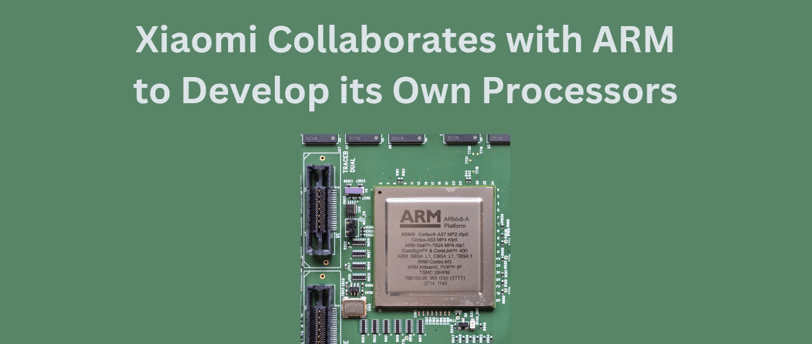Xiaomi Collaborates with ARM to Develop its Own Processors
Xiaomi, a leading innovator in the tech industry, announces a groundbreaking collaboration with ARM to develop its own processors. This strategic partnership marks a significant milestone for Xiaomi as it seeks to strengthen its position in the mobile market. Delve into the details of this collaboration and explore how Xiaomi aims to leverage ARM's expertise in chip design to create custom processors tailored to its devices. Uncover the potential implications for Xiaomi's product lineup, including enhanced performance, power efficiency, and unique features enabled by these custom processors. Stay ahead of the curve with insights into Xiaomi's ambitious venture into semiconductor technology, driving innovation and differentiation in the competitive landscape of mobile devices.
TECH NEWS


In the world of smartphones, the processor is often referred to as the heart of the device. It is responsible for processing all the tasks and operations, ensuring smooth and efficient performance. Currently, big players like Qualcomm and MediaTek dominate the market when it comes to smartphone processors. However, it seems that Xiaomi, a prominent smartphone manufacturer, is looking to shake things up by venturing into the realm of chip development in collaboration with ARM.
The news about Xiaomi's collaboration with ARM to develop its own processors was initially reported by popular tipster Digital Chat Station on Weibo. The report suggests that ARM, a leading semiconductor and software design company, has joined forces with Xiaomi to work on chip development. While the original report from Counterpoint Research, which confirmed MediaTek CEO Rick Tsai's statement about the collaboration, is hard to find, the implications of this partnership are significant. You can refer following image.
This move by Xiaomi to develop its own processors marks a departure from the traditional approach of relying on established chip manufacturers. By partnering with ARM, a company known for its expertise in processor design, Xiaomi aims to gain more control over the hardware aspect of its smartphones. This strategic decision allows Xiaomi to tailor the processors specifically to its devices, optimizing performance and efficiency.
It is worth noting that ARM has previously collaborated with other smartphone manufacturers, such as Oppo, in chip development projects. However, the partnership with Xiaomi holds great potential due to the company's growing market presence and its commitment to innovation. Xiaomi has consistently pushed boundaries with its smartphones, offering high-quality devices at competitive prices. By developing its own processors, Xiaomi can further differentiate itself from its competitors and potentially enhance its overall product offering.
The advantages of developing in-house processors are numerous. Firstly, it allows Xiaomi to have greater control over the entire manufacturing process, from design to production. This level of control ensures that the processors are optimized for Xiaomi's specific software and hardware requirements, resulting in improved performance and energy efficiency. Additionally, by reducing reliance on external chip manufacturers, Xiaomi can potentially lower production costs and increase profit margins.
Another significant benefit of developing its own processors is the potential for customization. Xiaomi can tailor the processors to suit its unique smartphone features and functionalities. This customization enables Xiaomi to deliver a more seamless user experience, with optimized performance for specific tasks such as gaming, multitasking, or photography. By fine-tuning the processors to work harmoniously with its software, Xiaomi can offer a more cohesive and efficient user experience.
Furthermore, developing its own processors opens up opportunities for Xiaomi to innovate and experiment with new technologies. With full control over the chip design, Xiaomi can integrate cutting-edge features and capabilities into its processors, pushing the boundaries of what is possible in smartphone performance. This level of innovation can give Xiaomi a competitive edge in the market and attract tech-savvy consumers who are constantly seeking the latest advancements in smartphone technology.
While the collaboration between Xiaomi and ARM is still in its early stages, the potential impact on the smartphone industry is significant. If successful, Xiaomi's foray into chip development could disrupt the dominance of established players like Qualcomm and MediaTek. This move not only strengthens Xiaomi's position as a leading smartphone manufacturer but also paves the way for other companies to explore in-house processor development.
In conclusion, Xiaomi's collaboration with ARM to develop its own processors marks a significant step towards greater control and innovation in the smartphone industry. By partnering with ARM, Xiaomi aims to optimize performance, enhance user experience, and potentially disrupt the market. This strategic move showcases Xiaomi's commitment to pushing boundaries and delivering high-quality devices to its customers. As the collaboration progresses, it will be interesting to see how Xiaomi's in-house processors shape the future of smartphones.


